- Home
- Sue Grafton
P is for PERIL
P is for PERIL Read online
“P” is for PERIL
Sue Grafton
(A Kinsey Millhone Mystery)
Chapter 1
*
The house on Old Reservoir Road appeared to be in the final phases of construction. I spotted the site as I rounded the curve, recognizing the unfinished structure from Fiona Purcell’s description. To my right, I could see a portion of the reservoir for which the road was named. Brunswick Lake fills the bottom of a geological bowl, a spring-fed body that supplied the town with drinking water for many years. In 1953 a second, larger catch basin was established, and now Brunswick is little more than an irregular blue splotchlet on maps of the area. Swimming and boating are forbidden, but seasonally the migrating water birds rest on the placid surface as they make their way south. The surrounding hills are austere, gentle swells rising to the mountains that mark the northernmost boundary of the Santa Teresa city limits.
I parked my VW on the gravel berm and crossed the two-lane road. The steeply pitched lot was still bare of landscaping and consisted entirely of raw dirt and boulders with a dusting of weeds taking hold. At street level, a big commercial Dumpster was piled high with debris. A small grove of signs planted in the yard announced the names of the building contractor, the painting contractor, and the architect, though Mrs. Purcell had been quick to assure me by phone that she’d drawn up the plans herself. The design – if that’s what you want to call it – would have been approved by the Department of Defense: an implacable series of concrete boxes, staunch and unadorned, stacked up against the hillside under a pale November sun. The facade was as blank as a bunker, a radical contrast to the sprawling Spanish-style homes on adjacent properties. Somewhere to the rear of the house, there must have been a driveway leading to garages and a parking pad, but I opted for the stairs built into the barren hillside. At six A.M., I’d done a three-mile jog, but I’d skipped my Friday-morning weight lifting to keep this early appointment. It was just now eight o’clock and I could feel my butt dragging as I mounted the steps.
Behind me, I could hear a dog bark. Its deep-throated yaps echoed through the canyon, conveying a message of excitement. A woman was calling, “Trudy! Truuddy!” while the dog barked on. She emitted a piercing whistle, and a young German shepherd came bounding over the hill, heading in my direction at full speed. I waited, bracing myself for the force of muddy feet, but at the last possible second, the whistle came again and the dog sprinted off. I continued climbing Fiona’s wide concrete steps, tacking twice before I reached the upper terrace with its plain limestone portico that shaded the front entrance. By then, my thighs were burning, I was huffing and puffing, and my heart was rat-a-tat-tatting like machine-gun fire. I could have sworn there was less oxygen in the air up here, but I’d actually only climbed the equivalent of two stories and I knew it was probably no more than three – to four-hundred feet above sea level. I turned, pretending to admire the view while I recovered my breath.
From this aerie, I could see the broad, shimmering band of the Pacific Ocean stitched to the shoreline some five miles away. Before me, the day was so clear, I could almost count the mountain ridges on the islands twenty-six miles out. Behind me, the clouds were peering over the mountaintops, a fast-moving blanket of dark gray in advance of a storm. San Francisco, four hundred miles to the north of us, was already feeling its lash.
By the time I rang the bell, my breathing had slowed and I’d done a quick mental review of the subject I was here to discuss. Fiona Purcell’s ex-husband, Dr. Dowan Purcell, had been missing for nine weeks. She’d had a messenger deliver a manila envelope filled with newspaper clippings that recapped events surrounding his disappearance. I’d sat in my office, tilted back in my swivel chair, my Sauconys propped on the edge of my desk while I studied the articles she’d sent. She’d arranged them chronologically but had otherwise presented them without editorial comment. I’d been following the story in the local papers, but I’d never anticipated my involvement in the case. I found it helpful to have the sequence laid out again in this truncated form.
I noticed that over the course of nine weeks, the character of the coverage had shifted from the first seventy-two hours of puzzlement, through days of feverish speculation, and into the holding pattern that represented the current state of the investigation. Nothing new had come to light – not that there was ever much to report. In the absence of fresh revelations, the public’s fascination had begun to dwindle and the media’s attention to the matter had become as chilly and abbreviated as the brief November days. It is a truth of human nature that we can ponder life’s mysteries for only so long before we lose interest and move on to something else. Dr. Purcell had been gone since Friday, September 12, and the lengthy column inches initially devoted to his disappearance were now reduced to an occasional mention nearly ritual in its tone. The details were recounted, but the curiosity had shifted to more compelling events.
Dr. Purcell, sixty-nine years old, had practiced family medicine in Santa Teresa since 1944, specializing in geriatrics for the last fifteen years. He’d retired in 1981. Six months later, he’d been licensed as the administrator of a nursing care facility called Pacific Meadows, which was owned by two businessmen. On the Friday night in question, he’d worked late, remaining in his office to review paperwork related to the operation of the nursing home. According to witnesses, it was close to nine o’clock when he stopped at the front desk and said goodnight to the nurses on duty. At that hour, the occupants had settled down for the night. The corridors were empty and the residents’ doors were closed against the already dimmed hall lights. Dr. Purcell had paused to chat with an elderly woman sitting in the lobby in her wheelchair. After a cursory conversation, less than a minute by her report, the doctor passed through the front door and into the night. He retrieved his car from his reserved space at the north side of the complex, pulled out of the lot, and drove off into the Inky Void from which he’d never emerged. The Santa Teresa Police and the Santa Teresa County Sheriffs Departments had devoted endless hours to the case, and I couldn’t think what avenues remained that hadn’t already been explored by local law enforcement.
I rang the bell again. Fiona Purcell had told me she was on her way out of town, a five-day trip to San Francisco to purchase furniture and antiques for a client of her interior design firm. According to the papers, Fiona and the doctor had been divorced for years. Idly, I was wondering why she’d been the one who called me instead of his current wife, Crystal.
I saw a face appear in one of the two glass panels that flanked the entrance. When she opened the door, I saw that she was already dressed for travel in a double-breasted pin-striped suit with wide lapels. She held a hand out. “Ms. Millhone? Fiona Purcell. Sorry to make you wait. I was at the back of the house. Please come in.”
“Thanks. You can call me Kinsey if you like. Nice meeting you,” I said.
We shook hands and I moved into the entrance hall. Her handshake was limp, always startling in someone who, otherwise, seems brisk and businesslike. I placed her in her late sixties, close to Dr. Purcell’s age. Her hair was dyed a dark brown, parted on one side, with puffy bangs and clusters of artificially constructed curls pulled away from her face and secured by rhinestone combs, a style affected by glamour-girl movie stars of the 1940s. I half-expected an appearance by John Agar or Fred MacMurray, some poor, feckless male who’d fallen prey to this vixen with her fierce shoulder pads. She was saying, “We can talk in the living room. You’ll have to pardon the mess.”
Scaffolding had been erected in the foyer, reaching to the lofty ceiling. Drop cloths lined the stairs and the wide corridor leading to the rear of the house. To one side of the stairs, there was a console table and a streamlined chrome lamp. Currently, we seemed to be the only tw
o on the premises.
“Your flight’s at ten?” I asked.
“Don’t worry about it. I’m eight minutes from the airport. We have at least an hour. May I offer you coffee? I’m having mine in here.”
“No, thanks. I’ve had two cups this morning and that’s my limit most days.”
Fiona moved to the right and I followed in her wake, crossing a broad expanse of bare cement. I said, “When do the floors go in?”
“These are the floors.”
I said, “Ah,” and made a mental note to quit asking about matters far beyond my ken.
The interior of the house had the cool, faintly damp smell of plaster and fresh paint. All the walls in range were a dazzling white, the windows tall and stark, unadorned by any curtains or drapes. A sly glance behind me revealed what was probably the dining room on the far side of the entryway, empty of furniture, subdivided by rhomboids of clear morning light. The echo of our footsteps sounded like a small parade.
In the living room, Fiona gestured toward one of two matching armchairs, chunky and oversized, upholstered in a neutral-toned fabric that blended with the gray cement floor. A large area rug showed a densely woven grid of black lines on gray. I sat when she did, watching as she surveyed the space with the practiced eye of an aesthete. The furnishings were striking: light wood, tubular steel, stark geometric shapes. An enormous round mirror, resting in a crescent of chrome, hung above the fireplace. A tall silver and ivory coffeepot, with a matching creamer and sugar bowl, sat on a silver tray on the beveled-glass coffee table. She paused to refill her cup. “Are you a fan of art deco?”
“I don’t know much about it.”
“I’ve been collecting for years. The rug’s a Da Silva Bruhns. This is Wolfgang Tumpel’s work, if you’re familiar with the name,” she said, nodding at the coffee service.
“Beautiful,” I murmured, clueless.
“Most of these pieces are one of a kind, created by craftsmen who were masters in their day. I’d go on rattling the names off, but I doubt they’d mean much if you’re not acquainted with the period. I built this as a showcase for my collection, but as soon as the house is finished, I’ll probably sell it and move on. I’m impatient by nature and far too restless to stay here long.” She had strong features: thinly arched brows and dark, smudged eyes, with pronounced streaks of weariness descending from the inner corners. She took a sip of coffee and then paused to extract a cigarette from a pack sitting on the table. The lighter she used was one of those small gold items and made very little sound when she flipped the cover back and thumbed the striker wheel. She held the lighter in her palm and drew deeply on her cigarette, clearly savoring the relief. She tilted her head toward the ceiling and blew the smoke out in a stream. I figured I could always drop my blazer at the cleaners on the way home.
She said, “I don’t think I mentioned this when we chatted the other day, but Dana Glazer suggested I get in touch with you. I believe she was Dana Jaffe when you were acquainted with her.”
“Really. How do you know her?”
“I’m helping her redecorate her home. She’s now married to one of Dow’s associates, Joel Glazer, whose first wife died. Do you know Joel?
He’s a partner in a company called Century Comprehensive that owns a chain of nursing homes among other things.”
“I know the name Glazer from the papers. I’ve never met him,” I said. Her call was beginning to make sense, though I still wasn’t sure how I could be of service. Dana Jaffe’s first husband, Wendell, had disappeared in 1979, though the circumstances – on the surface – were very different from the current case. Wendell Jaffe was a self-made real estate tycoon who’d faked his own death, showing up in Mexico shortly after his “widow” had collected half a million dollars in life insurance benefits. Wendell was facing jail time after a Ponzi scheme he’d cooked up threatened to unravel, exposing his chicanery. The “pseudocide” was his attempt to avoid the inevitable felony conviction. He might have pulled it off, but he’d been spotted in Mexico by a former acquaintance, and I’d been dispatched by the insurance company, who wanted their money back. I wondered if Fiona suspected her ex-husband had pulled a fast one as well.
She set her coffee cup aside. “You received the articles?”
“A messenger dropped them off at the office yesterday. I read them last night and then again this morning. The police have been thorough…”
“Or so they’d like us to think.”
“You’re not happy with their progress?”
“Progress! What progress? Dowan is still missing. I’ll tell you what they’ve accomplished: zilch. I grant you, they’re going through the motions – making public pronouncements, trumpeting their concerns – but it’s all sound and fury, signifying nothing.”
I objected to her attitude but decided not to protest just yet. I think the cops are terrific, but why argue the point? She wanted to hire me and I was here to determine what, if anything, I could contribute. “What’s the latest?” I asked.
“No one’s heard a peep from him – at least as far as I’ve been told.” She took another drag on her cigarette and then tapped the ash into a heavy crystal ashtray. Her lipstick was dark and bled into the fine hairline crevices along her upper lip. She’d left a distinct half-moon on the coffee cup and a full ring around the filter of her cigarette. Her jewelry was clunky: big clip-on silver earrings and a matching bracelet. The effect was stylish, but everything about her suggested estate sales and vintage clothing shops. I fancied if I’d bent close, I’d have picked up the whiff of moth balls and cedar closets, mingled with scents from the ’40s, Shalimar and Old Golds. In moments, her looks were striking, harsh flickers of beauty she seemed at pains to accentuate. She lowered her eyes. “Of course, you realize we’re divorced.”
“There was reference to that in one of the articles you sent. What about his current wife?”
“I’ve only spoken to Crystal once throughout this whole ordeal. She’s gone to great lengths to keep me out of the loop. I receive updates through my daughters, who’ve made it a point to stay in close touch with her. Without them, I’d have even less information than I do, which God knows, isn’t much.”
“You have two girls?”
“Correct. My youngest, Blanche, and her husband are only four blocks away. Melanie, the older one, lives in San Francisco. I’ll be staying with her ‘til Tuesday afternoon of next week.”
“Any grandchildren?”
“Mel’s never been married. Blanche is expecting her fifth in about three weeks.”
I said, “Wow.”
Fiona’s smile was sour. “Motherhood’s just her way of avoiding a real job.”
“A ‘real’ job sounds easier. I couldn’t do what she does.”
“She barely manages herself. Fortunately, the children have a nanny who’s extremely competent.”
“How do your daughters get along with Crystal?”
“Fine, I suppose. Then again, what choice do they have? If they don’t dance to her tune, she’ll make sure they never see their father or their half-brother again. You know Dow and Crystal have a son? His name is Griffith. He just turned two.”
“I remember mention of the boy. May I call you Fiona?”
She took another drag of her cigarette and placed it on the lip of the ashtray in front of her. “I’d prefer Mrs. Purcell, if it’s all the same to you.” Smoke trailed from her mouth as she spoke and she seemed to study it, bemused.
“Yes, well. I’m wondering if you have a theory about your ex-husband’s disappearance.”
“You’re one of the few who’s even bothered to ask. Apparently, my opinion is of no concern. I suspect he’s in Europe or South America, biding his time until he’s ready to come home. Crystal thinks he’s dead – or so I’ve heard.”
“It’s not so far-fetched. According to the papers, there’s been no activity on his credit cards. There’s been no sign of his car and no sign of him.”
“Well, that’s not qu
ite true. There’ve been a number of reports. People claim to have spotted him as far away as New Orleans and Seattle. He was seen getting on a plane at JFK and again south of San Diego, heading for Mexico.”
“There are still sightings of Elvis. That doesn’t mean he’s alive and well.”
“True. On the other hand, someone fitting Dow’s description tried to cross into Canada but walked away when the immigration officer asked to see his passport, which is missing, by the way.”
“Really. That’s interesting. The papers didn’t mention it. I take it the police have followed up?”
“One can only hope,” she remarked. There was something hollow in her tone. If she could only persuade me, then perhaps what she said would turn out to be true.
“You’re convinced he’s alive?”
“I can’t imagine otherwise. The man has no enemies and I can’t conceive his being the victim of ‘foul play,’” she said, forming the quote marks with her fingers. “The idea’s absurd.”
“Because?”
“Dow’s perfectly capable of taking care of himself – physically, at any rate. What he’s not capable of doing is facing the problems in life. He’s passive. Instead of fight or flight, he lies down and plays dead – in a manner of speaking. He’d rather do anything than deal with conflict, especially involving women. This goes back to his mother, but that’s another story altogether.”
“Has he done anything like this before?”
“As a matter of fact, he has. I tried to explain this to the police detective. In vain, I might add. Dowan’s done this twice. The first time, Melanie and Blanche were – what? – probably only six and three. Dowan disappeared for three weeks. He left without warning and returned much the same way.”
“Where’d he go?”
“I have no idea. The second time was similar. This was years later, before we separated for good. One day he was here; the next, he was gone. He came back a few weeks later without a murmur of explanation or apology. Naturally, I’ve assumed this recent disappearance was a repeat performance.”

 S Is for Silence
S Is for Silence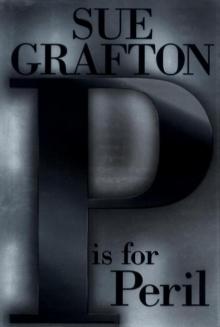 P Is for Peril
P Is for Peril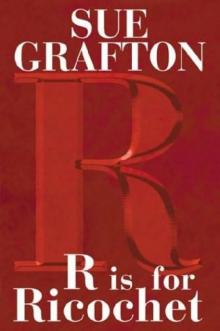 R Is for Ricochet
R Is for Ricochet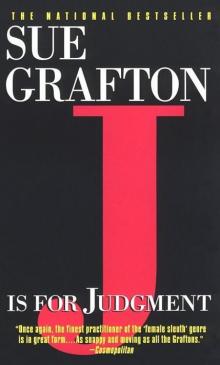 J Is for Judgment
J Is for Judgment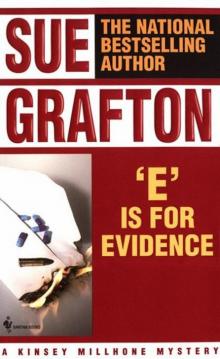 E Is for Evidence
E Is for Evidence T Is for Trespass
T Is for Trespass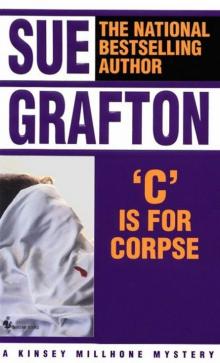 C Is for Corpse
C Is for Corpse U Is for Undertow
U Is for Undertow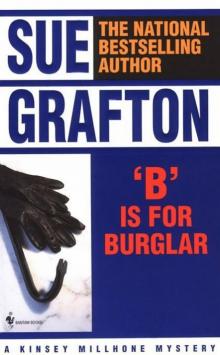 B Is for Burglar
B Is for Burglar Four Sue Grafton Novels
Four Sue Grafton Novels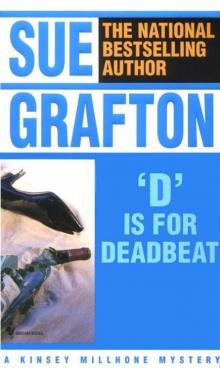 D Is for Deadbeat
D Is for Deadbeat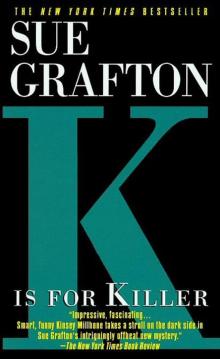 K Is for Killer
K Is for Killer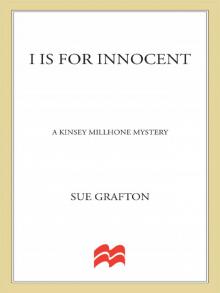 I Is for Innocent
I Is for Innocent A Is for Alibi
A Is for Alibi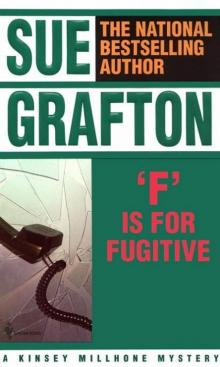 F Is for Fugitive
F Is for Fugitive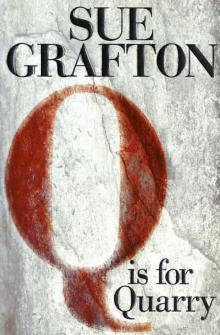 Q Is for Quarry
Q Is for Quarry W Is for Wasted
W Is for Wasted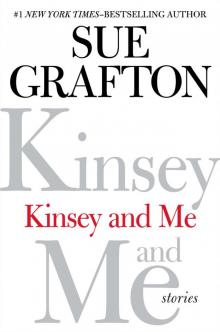 Kinsey and Me: Stories
Kinsey and Me: Stories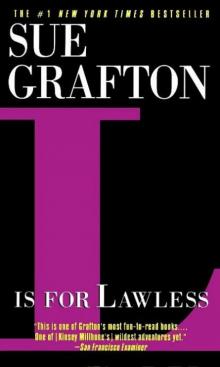 L Is for Lawless
L Is for Lawless Y Is for Yesterday
Y Is for Yesterday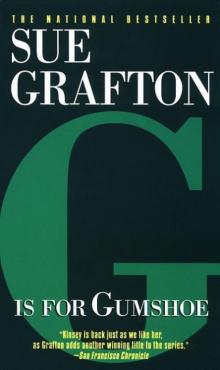 G Is for Gumshoe
G Is for Gumshoe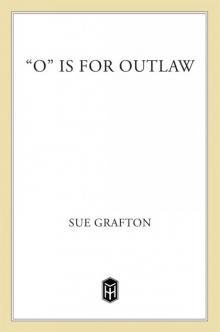 O Is for Outlaw
O Is for Outlaw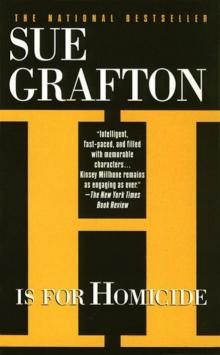 H Is for Homicide
H Is for Homicide X
X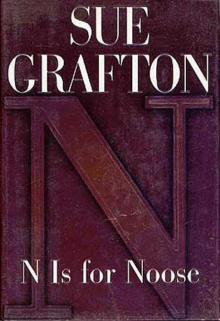 N Is for Noose
N Is for Noose Three Complete Novels: A Is for Alibi / B Is for Burglar / C Is for Corpse
Three Complete Novels: A Is for Alibi / B Is for Burglar / C Is for Corpse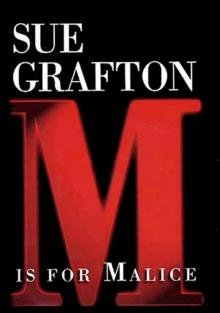 M Is for Malice
M Is for Malice I is for INNOCENT
I is for INNOCENT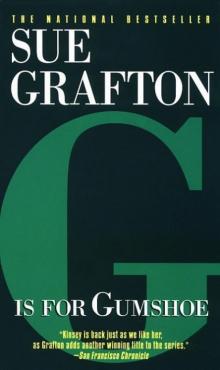 G is for GUMSHOE
G is for GUMSHOE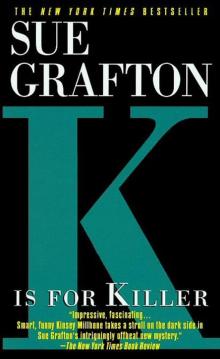 K is for KILLER
K is for KILLER S is for SILENCE
S is for SILENCE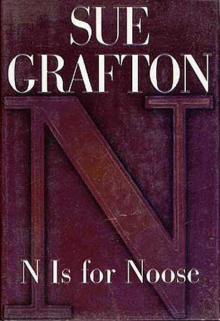 N is for NOOSE
N is for NOOSE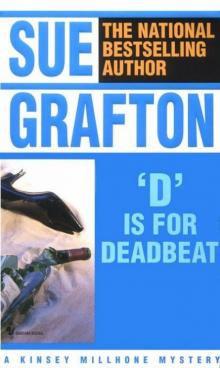 D is for DEADBEAT
D is for DEADBEAT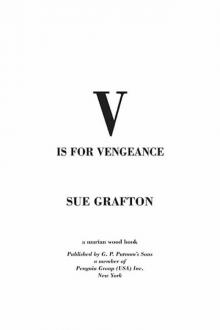 V is for Vengeance
V is for Vengeance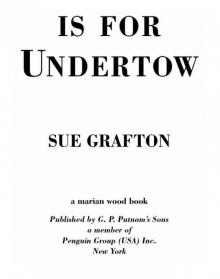 U is for Undertow
U is for Undertow W Is for Wasted km-23
W Is for Wasted km-23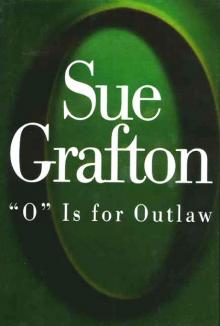 O is for OUTLAW
O is for OUTLAW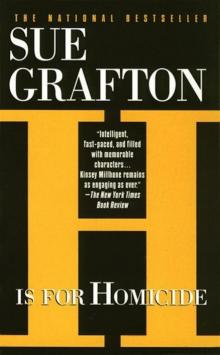 H is for HOMICIDE
H is for HOMICIDE Sue Grafton Novel Collection
Sue Grafton Novel Collection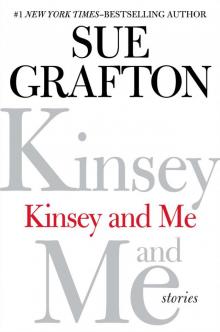 Kinsey and Me
Kinsey and Me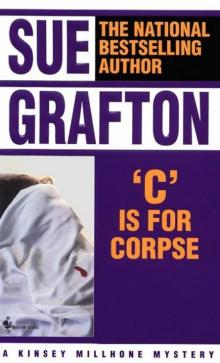 C is for CORPSE
C is for CORPSE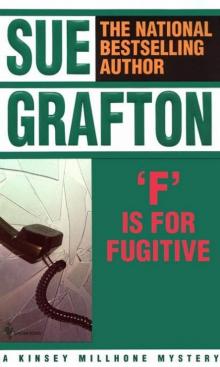 F is for FUGITIVE
F is for FUGITIVE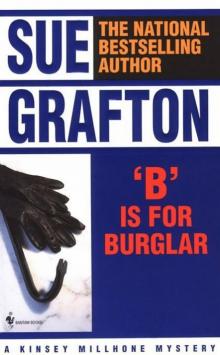 B is for BURGLAR
B is for BURGLAR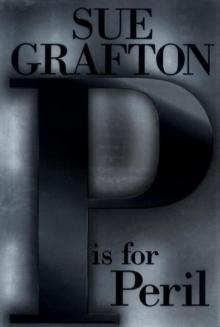 P is for PERIL
P is for PERIL A is for ALIBI
A is for ALIBI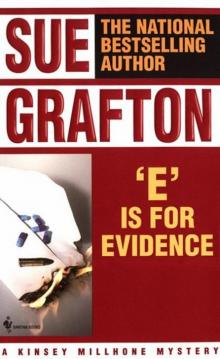 E is for EVIDENCE
E is for EVIDENCE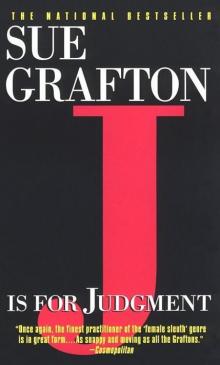 J is for JUDGMENT
J is for JUDGMENT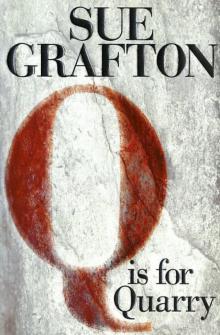 Q is for QUARRY
Q is for QUARRY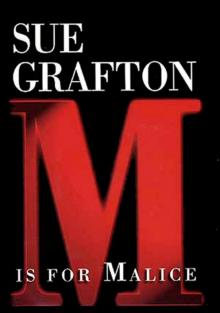 M is for MALICE
M is for MALICE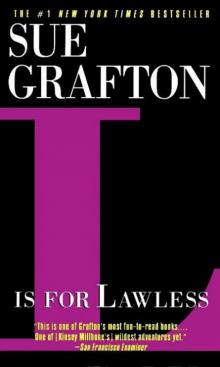 L is for LAWLESS
L is for LAWLESS